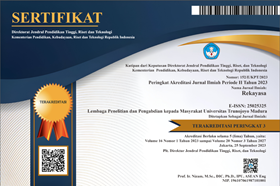Risk Analysis in the Construction Industry Using Project Management Life Cycle and House of Risk
Abstract
This study aims to identify risks arising in housing construction projects, particularly those related to budget overruns, and to develop mitigation strategies to ensure that projects run according to plan in terms of cost, time, and resources. The methods used are the Project Management Life Cycle (PMLC) to map the project stages from initiation to closure, and the House of Risk (HoR) to identify risk events and risk agents. The novelty of this study lies in the development of difficulty analysis in HoR, which focuses on three main aspects —cost, time, and resources — that have not been explicitly described in previous studies. The results show that the project experienced a cost increase from IDR 150 million to IDR 165 million due to dominant risks, including misinterpretation of design drawings, fluctuations in material prices, and work delays. Through HoR analysis, priority risks were successfully identified, and mitigation strategies were developed in the form of team training to improve design understanding, control of material usage, and the implementation of contingency planning. This research contributes academically by modifying the HoR method with difficulty analysis based on cost, time, and resources, and integrating it with PMLC. It also provides practical guidance to contractors and project managers on anticipating and managing risks more effectively, thereby improving cost efficiency, timeliness, and resource optimization in housing construction projects.
Keywords
Full Text:
PDFReferences
A.P., Hari Purnomo, R. A. A. (2021). Identification and Risk Control of the Haccp System Implementation in the Pasteurized Crab Production Process. Journal of Vocational Health Studies, 5(2), 94. https://doi.org/10.20473/jvhs.v5.i2.2021.94-99
Aerts, G., Dooms, M., & Haezendonck, E. (2017). Knowledge transfers and project-based learning in large scale infrastructure development projects: an exploratory and comparative ex-post analysis. International Journal of Project Management, 35(3), 224–240. https://doi.org/10.1016/j.ijproman.2016.10.010
Ardiansyah, N., & Nugroho, S. (2022). Implementasi Metode House of Risk (HoR) pada Pengelolaan Risiko Rantai Pasok Produk Seat Track Adjuster 4L45W. Prosiding SENIATI, 6(1), 156–166. https://doi.org/10.36040/seniati.v6i1.4935
Chairani, C., & Siregar, S. V. (2021). The effect of enterprise risk management on financial performance and firm value: the role of environmental, social and governance performance. Meditari Accountancy Research, 29(3), 647–670. https://doi.org/10.1108/MEDAR-09-2019-0549
Denicol, J., Davies, A., & Krystallis, I. (2020). What Are the Causes and Cures of Poor Megaproject Performance? A Systematic Literature Review and Research Agenda. Project Management Journal, 51(3), 328–345. https://doi.org/10.1177/8756972819896113
Dille, T., Söderlund, J., & Clegg, S. (2018). Temporal conditioning and the dynamics of inter-institutional projects. International Journal of Project Management, 36(5), 673–686. https://doi.org/10.1016/j.ijproman.2018.03.007
Ebrahimi, S., Vachal, K., & Szmerekovsky, J. (2022). A Delphi-FMEA model to assess county-level speeding crash risk in North Dakota. Transportation Research Interdisciplinary Perspectives, 16(July), 100688. https://doi.org/10.1016/j.trip.2022.100688
Harrison, J. W., Lewis, M. A., Roehrich, J. K., & Davies, A. (2024). Scale in Project Management: A Review and Research Agenda. Project Management Journal. https://doi.org/10.1177/87569728241256611
Hillebrandt, P. M. (1974). Economic Theory and the Construction Industry. In Economic Theory and the Construction Industry. https://doi.org/10.1007/978-1-349-01927-4
Hobbs, B., & Petit, Y. (2017). Agile Methods on Large Projects in Large Organizations. Project Management Journal, 48(3), 3–19. https://doi.org/10.1177/875697281704800301
Ir. Iman Soeharto. (1999). Manajemen Proyek. In Journal of the Korean Physical Society (Vol. 0, Issue 0).
Kleiss, T., & Imura, H. (2006). The Japanese private finance initiative and its application in the municipal solid waste management sector. International Journal of Project Management, 24(7), 614–621. https://doi.org/10.1016/j.ijproman.2006.07.007
Magdalena, R. (2019). Analisis Risiko Supply Chain Dengan Model House of Risk (Hor) Pada Pt Tatalogam Lestari. Jurnal Teknik Industri, 14(2), 53.
Müller, R., Zhai, L., Wang, A., & Shao, J. (2016). A framework for governance of projects: Governmentality, governance structure and projectification. International Journal of Project Management, 34(6), 957–969. https://doi.org/10.1016/j.ijproman.2016.05.002
Nyoman Pujawan, I., & Geraldin, L. H. (2009). House of risk: a model for proactive supply chain risk management. Business Process Management Journal, 15(6), 953–967. https://doi.org/10.1108/14637150911003801
Omakwu, S. O., & Chen, L. (2023). Integrating Sample Iterative Communication Model into Project Management Life Cycle Phases. Proceedings - 2023 Congress in Computer Science, Computer Engineering, and Applied Computing, CSCE 2023, July 2023, 2678–2682. https://doi.org/10.1109/CSCE60160.2023.00427
Proaño-narváez, M., Flores-vázquez, C., Quiroz, P. V., & Avila-calle, M. (2022). Application and Future Projections.
Sartono, S. E., & Ak, M. A. (2023). Akuntansi Pajak Jasa Konstruksi (p. 342). https://www.google.co.id/books/edition/AKUNTANSI_PAJAK_JASA_KONSTRUKSI/B0wCEQAAQBAJ?hl=id&gbpv=0
Saunders, F. C., Gale, A. W., & Sherry, A. H. (2016). Responding to project uncertainty: Evidence for high reliability practices in large-scale safety–critical projects. International Journal of Project Management, 34(7), 1252–1265. https://doi.org/10.1016/j.ijproman.2016.06.008
Utama, W. A., & Latief, Y. (2021). Analysis cost of safety on project irrigation/channel base on WBS (Work Breakdown Structure). IOP Conference Series: Materials Science and Engineering, 1098(2), 022027. https://doi.org/10.1088/1757-899x/1098/2/022027
Westland, J. (2006). The Project Management Life Cycle A Complete Step-by-Step Methodology for Initiating. In Planning, Executing and Closing the Project Successfully, Kogan. Kogan Page. https://books.google.com/books?hl=en&lr=&id=ImckBT9P-xwC&oi=fnd&pg=PR7&dq=The+implementation+strategy+provides+a+step-by-step+plan,+defining+the+tasks,+resources,+timelines,+responsibilities,+and+key+milestones+necessary+to+achieve+the+project%27s+objecti
DOI
https://doi.org/10.21107/rekayasa.v18i2.30820Metrics
Refbacks
- There are currently no refbacks.
Copyright (c) 2025 Ananda Syalsabila Hidayat, I Ketut Gunarta

This work is licensed under a Creative Commons Attribution-ShareAlike 4.0 International License.
























